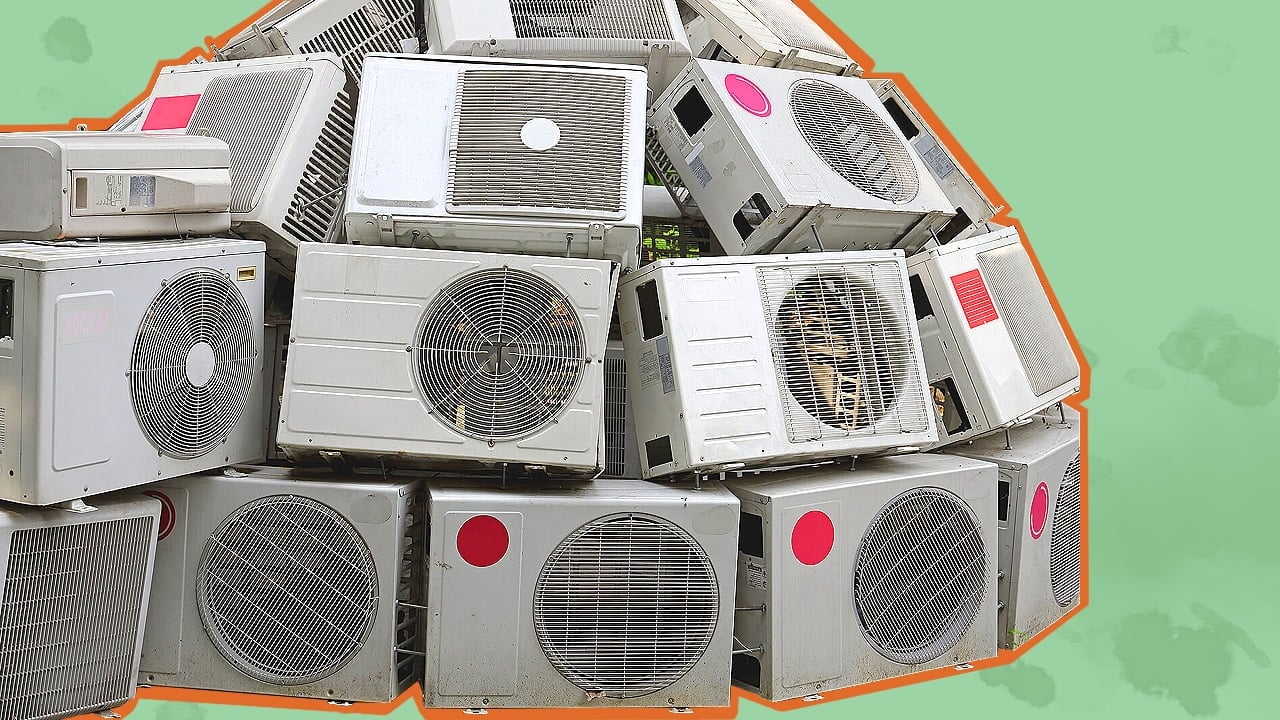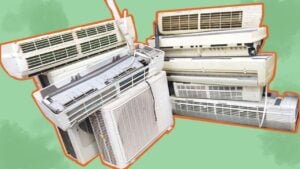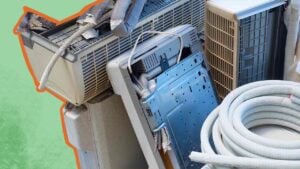Recycling an old air conditioner prevents the release of harmful greenhouse gases, mercury, and other substances that cause ozone depletion. Follow the municipal waste management regulations to avoid legal action and safely dispose of the old air conditioner.

If your old air conditioner fails to deliver proper cooling and you are considering getting a new model, proper disposal of the old unit is vital. Since they contain harmful refrigerants, such units pose a health hazard when left in the open.
That’s why you must know how to get rid of the old air conditioner by following the proper guidelines and information. In this guide, I’ve highlighted a few easy methods to help you.
Why Do You Need To Dispose Of An Old Air Conditioner Correctly?

Disposing of old air conditioners isn’t as easy as dumping them in open ground or handing them over to the local disposal agency. Remember that even the smallest air conditioning units weigh several pounds, comprising several layers of copper, aluminum, plastic, stainless steel, and other non-biodegradable substances.
The only biodegradable component of an air conditioner is the paper filter, so most of the materials in an ac unit are harmful to the natural environment and people. However, refrigerants are one of the most dangerous components in air conditioning units.
This is especially true of old air conditioners that use more toxic chlorofluorocarbons as a refrigerant. But these refrigerants were gradually phased out in 1995, following which modern air conditioning units started using halogenated chlorofluorocarbons (R-22).
However, the R-22 was phased out after more sustainable units were found post-2010. The production of any window AC unit or other air conditioners having R-22 was stopped in 2020, but many of those old appliances are still being used.
R-410A is among the most widely used refrigerants nowadays, although it still poses a threat. Despite being less hazardous, 1 kg of R-410A has the same environmental impact as running a car continuously for 6 months.
Governing Laws
The US government has laid down certain rules to counter the depletion of the ozone layer and keep climate change under control by reducing the greenhouse effect. The government has made it necessary to reclaim the refrigerants first to guarantee the proper disposal of any AC unit.
Moreover, the equipment used to properly dispose of HVAC systems must satisfy performance standards to reclaim the entire refrigerant. Local authorities, like a regular trash or local utility company, can do this, provided they possess the necessary qualifications.
You should also find out if the local government has additional rules for picking and disposing of old appliances.
How To Dispose Of An Air Conditioner?
1. Responsible Appliance Disposal Program
The United States Environmental Protection Agency (EPA) regulations have special programs for window air conditioners and other models, known as the Responsible Appliance Disposal (RAD) program. By partnering with qualified technicians or a third-party agency, old appliances are sent to facilities for recycling them.
Currently, multiple locations across 32 states collect air conditioners to keep residents safe. This helps curb the impact of greenhouse gases, so you can contact a licensed scrap yard. I also suggest browsing the government website and looking at the EPA’s available partners.
2. Rebate Program
Many local utility companies and governments offer rebate programs to people who drop off their old, inefficient air conditioners to replace them with new AC units. You can get in touch with an electricity provider to know about rebate programs available in your area.
Availing of the rebate will help you save additional costs on the new air conditioner while ensuring the old air conditioner is disposed of properly. Thanks to such rebates, more people will be willing to get rid of their old unit as per the regulations and reduce environmental impact.
3. Local Sanitation Department
When you are confused about how to dispose of the old unit safely, especially if it’s leaking, it would be best to contact a local disposal service. To take care of the leaked refrigerant, they will take the unit to a special area to dispense such air conditioners. Moreover, these organizations hire only qualified personnel to handle the air conditioner to keep everyone safe.
Contact the sanitation agency and learn about their disposal methods or rates. Sometimes, they outsource the task to a third-party waste collection service and oversee operations.
4. Local Charity
Another option is to give the air conditioner to a local charity, which will come in handy for people who are in need. But make sure the air conditioner is in fairly proper condition to make a difference in people’s lives.
You should know that people over 65 years are highly prone to heat-related issues. Plus, many shelters providing accommodation to the homeless might need old air conditioners. Contact these places directly for donations, or you can coordinate with a local aid group.
There are many non-profit organizations and faith-based groups that try to help people. Also, remember not to donate an air conditioner you have been using before 2010. This will prevent the harmful effects of the R-22 refrigerant from affecting someone else.
5. Recycle And Reuse
What if I told you that getting rid of old air conditioners can earn you tax deductions? It’s too great a deal to let pass, right? So, keep an eye out for local organizations that collect old air conditioners because they require spare parts.
You can donate your unit to them to recycle the air conditioner and reuse the old parts for other purposes. This is much better than dumping the model in a landfill with other home appliances and wastes.
Tell the organization about the lifespan of the air conditioner and model. They may not be able to reuse all the parts, but most metal and plastic pieces can be reworked.
6. Trash Pickups
While you can dispose of most things on the curb for the pickup company to collect, bulk trash pickup programs prove useful when you want to dispose of large items. In most cities, such trash collections occur every quarter in March, June, September, and December.
Unless it’s an emergency, you can contact the local garbage collector and book a date, requesting them to collect the waste in bulk. In most cases, all items you are throwing away, including the air conditioner, must be placed on the curb between 6 am before the pickup day and 7 am on the collection day.
Since such trash pickups adhere to a fixed schedule, placing the wastes too early or late and on unscheduled days, the disposal company will fine you for additional expenses. Also note that when an item is not picked up even 2 days after the scheduled pickup, you should retrieve it or report it as a lost item.
Remember that uncollected waste, lying around in bulk, is a form of public nuisance, prompting the authorities to take strict action.
7. Waste Transfer Stations
When you have started using a new air conditioner, sending the old one to waste transfer stations would be a good idea. These are industrial facilities that collect and store municipal waste temporarily.
After that, the waste is collected and sent to a landfill site or treatment unit for proper disposal. Although more efficient disposal methods are available, waste transfer stations sometimes are your best bet if the old air conditioner cannot be donated.
Also, waste transfer stations are often present next to material recovery centers, and they usually know what to do with a unit.
8. HVAC Retailers
People opting to replace their old air conditioner can request their HVAC retailer to take it and dispose of it properly. HVAC retailers often carry out disposal services, installation, maintenance, etc., and know what to do with old products.
Moreover, you can even get a new air conditioner at a lower cost when exchanging the old one.
Tip
Apart from recycling, donating, or exchanging the old air conditioner, you can refurbish it by contacting a professional service. This is an affordable technique for fixing leaking pipes, refilling the refrigerant, deep cleaning the internal components, repairing the condenser fans, etc.

Conclusion
Improper disposal of an old air conditioner is illegal, so opt for any of the safe disposal methods mentioned in my guide.
None of these methods will cost you a lot of money, and are easy to avail. Most importantly, when contacting a disposal service, check the consumer reviews and verify the employee credentials.
You can even upgrade the old air conditioner with smart controls and bring it up to modern standards. Such models can be connected to the internet and have weekly scheduling, temperature-based triggers, intelligent humidity, and geolocation.
